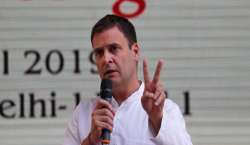'Chowkidar chor hai' remark: SC closes contempt case against Rahul Gandhi; says 'be more careaful in future'
BJP MP Minashki Lekhi had accused Rahul Gandhi of misquoting the April 10 order of the Supreme Court. Gandhi allegedly said that the apex court had accepted that 'chowkidar' (a reference to Prime Minister Modi), is a "chor' (thief).

The Supreme Court on Thursday shut a contempt plea filed by BJP MP Meenakshi Lekhi against Congress leader Rahul Gandhi for wrongly attributing to the court his “chowkidar chor hai” slogan against Prime Minister Narendra Modi in the Rafale case. A three-member bench headed by Chief Justice of India Ranjan Gogoi said the court accepted Rahul Gandhi's apology and warned him to be more careful in future” for attributing to the court his remarks.
On April 10, the top court had dismissed the Centre's preliminary objections over the admissibility of certain documents for supporting the review petitions against the December 14 last year verdict in the Rafale case. On which, Rahul Gandhi had made the “chowkidar chor hai” remark against Prime Minister Narendra Modi
Contempt case against Rahul Gandhi
BJP MP Minashki Lekhi had accused Rahul Gandhi of misquoting the April 10 order of the Supreme Court. Gandhi allegedly said that the apex court had accepted that 'chowkidar' (a reference to Prime Minister Modi), is a "chor' (thief).
Supreme Court on Chowkidar Chor hai remark
Pursuant to this, the Supreme Court had issued a contempt notice against Gandhi. A bench headed by Chief Justice Ranjan Gogoi was categorical that Gandhi had to either offer a clear-cut apology or face criminal contempt.
Gandhi's unconditional apology
Subsequently, Rahul Gandhi tendered an unconditional apology to the Supreme Court for wrongly attributing his "chowkidar chor hai" remark to the apex court and sought closure of the contempt proceedings against him.
Rahul Gandhi contempt of court
During the course of proceedings, former Attorney General Mukul Rohatgi, who represented Lekhi, had argued that Rahul Gandhi's apology should be rejected and action must be taken against him.
"He (Gandhi) deliberately put words in the mouth of the Supreme Court. Gandhi has only expressed regret. The law is clear in contempt cases that the line starts with an unconditional apology," he had submitted before the court.
Earlier, Rahul Gandhi had expressed regret for his remarks twice in two affidavits, saying that he made the comment in the "heat" of electioneering.